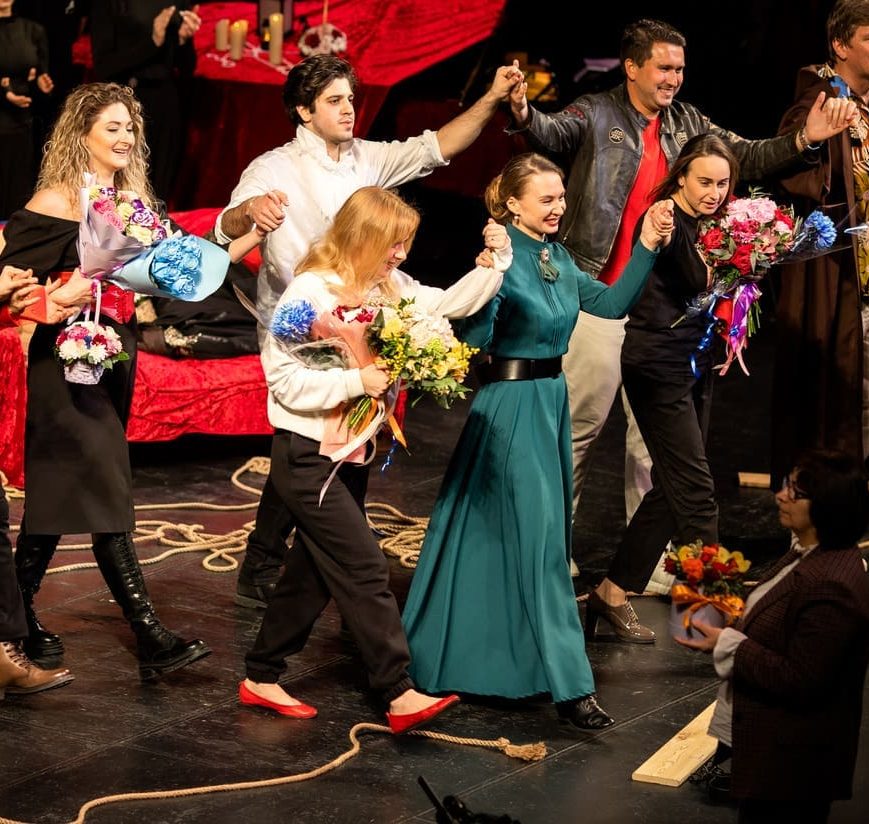Women composers were rehabilitated at the House of Music
The "Muffled Voices" opera festival has opened at the House of Music, featuring operas that have never been performed before. These works are by women composers who have been overshadowed in the composer's practice due to gender bias. Thanks to the festival organizers, their "muffled voices" were heard loudly and vividly. The festival is dedicated to the Russian composer Tatiana Chudova, an outstanding musician, pedagogue, professor at the Moscow Conservatory, who nurtured a host of talented composers and left an extensive creative legacy, including operas. Two of her operas were performed at the opening of the festival.
The Music House Theater Hall was filled to capacity, underscoring the existing interest in modern academic music and the demand for contemporary composers' works. The hall hosted many professional musicians, who were expecting genuine revelations. Two operas by Tatiana Chudova, "Tatiana's Dream," a mini-mono-opera based on A.S. Pushkin, and "Russian Women," a composition dedicated to the valor of the Decembrists' wives, were performed on the theatrical stage for the first time.
The unique opera festival "Muffled Voices" has opened at the House of Music, featuring operas predominantly unheard before, all composed by women who have been overshadowed due to gender bias in the field of composition. The festival is dedicated to Russian composer Tatiana Chudova, an outstanding musician, educator, and professor at the Moscow Conservatory, who nurtured talented composers and left a substantial legacy, including operas. Two of her operas premiered at the festival's opening.
The packed Music House Theater Hall reaffirmed the interest in contemporary academic music, indicating a demand for modern composers' works. Among the audience were professional musicians awaiting new discoveries. Tatiana Chudova's operas – "Tatiana's Dream," a mini mono-opera based on A.S. Pushkin, and "Russian Women," dedicated to the heroism of the Decembrists' wives – were staged for the first time. Chudova is a truly Russian composer, a disciple of Tikhon Khrennikov, who, through a few teaching 'handshakes,' took up the baton from the great N.A. Rimsky-Korsakov. She was the only female professor teaching composition at the Moscow Conservatory, a fact that clearly illustrates the status of women in the professional composing environment.
A young female musician (interestingly, in Russian, there is no generally accepted feminine term for 'musician' or 'composer,' unlike 'poet,' 'artist,' or 'writer') who studies composition once asked me why, among the many composers, only three women are known: Gubaidulina, Ustvolskaya, and Pakhmutova. The "Muffled Voices" festival answers this question: no, there are not just three. There are many more; they are talented, original, inventive, and their music deserves attention, public performance, and recognition.
Outstanding performers participated in the plays directed by Elizaveta Korneeva, who was once the recipient of the special "Moskovsky Komsomolets" prize at the "Nano-Opera" competition for young directors. Mezzo-soprano Aleksandra Kovalevich created a trembling, multifaceted portrayal of Tatyana Larina in the tiny mini-opera "Tatiana's Dream". The choreographic framing by Victoria Mikhaylets gave the composition a sense of completeness and theatricality. In "Russian Women," the contralto Olga Nadezhdina and soprano Yulia Petrachuk, who is also one of the initiators and organizers of this extraordinary festival, worked brilliantly.
And if Tatyana Chudova’s work is still more or less familiar to lovers of modern music, then the music performed in the second part turned out to be a complete discovery even for professionals. This discovery was the American composer Amy Mercy Beach and her opera “Cabildo,” written in the 30s of the twentieth century.
The chamber one-act opera is dedicated to an important page in American history, relating to the Battle of New Orleans in 1814, which hardly means anything to the Russian audience. However, it must be admitted that for Amy Beach, the historical theme is nothing more than a costume context. The story in the opera is absolutely lyrical: the plot centers on the legendary pirate Pierre Lafitte, who, under mysterious circumstances, emerges from a terrible prison called the Cabildo. According to Amy Beach, the pirate was released by the ghost of his beautiful lover, who continues to love the handsome filibuster even after death. In form, the performance is something between a musical and an opera, which is not surprising - outstanding hits by Hammerstein and Gershwin were already playing on Broadway at this time. However, Amy Beach finds various colors of the academic operatic style: with a magnificent vocal cantilena, end-to-end development, beautiful harmonies, and elegant instrumental solutions. The role of the orchestra is played by a piano trio: grand piano (Karina Pogosbekova), violin (Vasilisa Haddad), and cello (Galina Malyan), which is quite enough to create expressive textural effects.
Karina Pogosbekova should be especially highlighted - she not only performs the piano part in all three performances but also acts as the musical director of the entire festival.
The vocal composition of “Cabildo” is an ensemble of the highest class: Stanislav Lee (Pierre), Olga Seliverstova (Valerie), Polina Sharovarova (Mary), Ilya Khardikov (Tom), David Sanikidze (Domenique). There is a remarkable presence in the style of the opera-musical Denis Sedov, who masterfully moves from spoken language to vocalization. It is impossible not to note the excellent English of all the performers: the opera, as expected, sounds in the original language.
The festival will last several months, and performances will be held in different cities of Russia. During this time, the Russian audience will be able to hear and see seven more interesting operas written by women composers at different times, in different countries and in different styles. And I would like to believe that these works will not be limited to festival screenings.
Music critic EKATERINA KRETOVA
Translated from its original version from Moskovskij Komsomolets
Moscow, February 8, 2024

